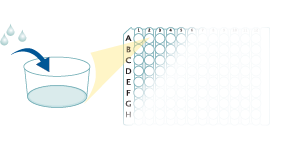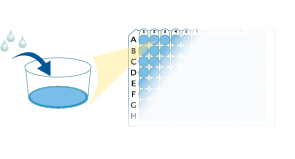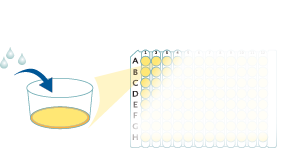Mouse E-Selectin/CD62E Quantikine ELISA Kit Summary
Product Summary
Recovery
The recovery of mouse sE-Selectin spiked to three levels throughout the range of the assay in various matrices was evaluated.
| Sample Type | Average % Recovery | Range % |
|---|---|---|
| Cell Culture Supernates (n=6) | 95 | 83-102 |
| EDTA Plasma (n=4) | 101 | 78-120 |
| Serum (n=10) | 98 | 83-118 |
Linearity
Scientific Data
Product Datasheets
Preparation and Storage
Background: E-Selectin/CD62E
The Selectin family is comprised of three members, E-Selectin, L-Selectin, and P-Selectin. E-Selectin [endothelial leukocyte adhesion molecule-1 (ELAM-1), CD62E] is transiently expressed on vascular endothelial cells in response to IL-1 beta and TNF-alpha. The human and rat proteins share approximately 67% amino acid sequence identity. The mouse and rat proteins share approximately 78% amino acid sequence identity. L-Selectin (Leukocyte Selectin, LAM-1, LECAM-1, LECCAM-1, TQ1, Leu-8, MEL-14 antigen, DREG, lymph node homing receptor, CD62L) is expressed constitutively on a wide variety of leukocytes. Two forms of L-Selectin have been reported, apparently arising as a result of post-translational modifications. Human and mouse L-Selectin share 76% amino acid sequence identity. Human P-Selectin (GMP-140, LECAM-3, PADGEM, CD62P) is expressed by activated platelets and endothelial cells. The extracellular domains of human and mouse P-Selectin share approximately 73% amino acid sequence identity.
Assay Procedure
Refer to the product- Prepare all reagents, standard dilutions, and samples as directed in the product insert.
- Remove excess microplate strips from the plate frame, return them to the foil pouch containing the desiccant pack, and reseal.
- Add 50 µL of Assay Diluent to each well.
- Add 50 µL of Standard, Control, or sample to each well. Cover with a plate sealer, and incubate at room temperature for 2 hours.
- Aspirate each well and wash, repeating the process 4 times for a total of 5 washes.
- Add 100 µL of Conjugate to each well. Cover with a new plate sealer, and incubate at room temperature for 2 hours.
- Aspirate and wash 5 times.
- Add 100 µL Substrate Solution to each well. Incubate at room temperature for 30 minutes. PROTECT FROM LIGHT.
- Add 100 µL of Stop Solution to each well. Read at 450 nm within 30 minutes. Set wavelength correction to 540 nm or 570 nm.





Citations for Mouse E-Selectin/CD62E Quantikine ELISA Kit
R&D Systems personnel manually curate a database that contains references using R&D Systems products. The data collected includes not only links to publications in PubMed, but also provides information about sample types, species, and experimental conditions.
19
Citations: Showing 1 - 10
Filter your results:
Filter by:
-
Pre-Administration of PLX-R18 Cells Protects Mice from Radiation-Induced Hematopoietic Failure and Lethality
Authors: VP Kumar, S Biswas, GP Holmes-Ham, M Sheleg, S Stone, B Legesse, R Ofir, SP Ghosh
Genes, 2022-09-28;13(10):.
Species: Mouse
Sample Types: Serum
-
Analysis of oxidative stress, inflammation and endothelial function following intravenous iron in chronic kidney disease in the Iron and Heart Trial
Authors: X Kassianide, V Allgar, IC Macdougall, PA Kalra, S Bhandari
Scientific Reports, 2022-04-27;12(1):6853.
Species: Human
Sample Types: Serum
-
Quercetin Completely Ameliorates Hypoxia-Reoxygenation-Induced Pathophysiology Severity in NY1DD Transgenic Sickle Mice: Intrinsic Mild Steady State Pathophysiology of the Disease in NY1DD Is Also Reversed
Authors: S Thangaswam, CA Branch, K Ambadipudi, SA Acharya
Biomolecules, 2021-10-06;11(10):.
Species: Mouse
Sample Types: Plasma
-
Interleukin-1 receptor inhibition reduces stroke size in a murine model of sickle cell disease
Authors: J Venugopal, J Wang, J Mawri, C Guo, D Eitzman
Haematologica, 2021-09-01;0(0):.
Species: Mouse
Sample Types: Plasma
-
Hydroxychloroquine reverses the prothrombotic state in a mouse model of antiphospholipid syndrome: Role of reduced inflammation and endothelial dysfunction
Authors: S Miranda, P Billoir, L Damian, PA Thiebaut, D Schapman, M Le Besnera, F Jouen, L Galas, H Levesque, V Le Cam-Duc, R Joannides, V Richard, Y Benhamou
PLoS ONE, 2019-03-14;14(3):e0212614.
Species: Mouse
Sample Types: Plasma
-
Simvastatin attenuates endothelial activation through 15-epi-lipoxin A4 production in murine chronic Chagas cardiomyopathy
Authors: Fabiola González-H
Antimicrob. Agents Chemother, 2017-02-23;0(0):.
Species: Mouse
Sample Types: Serum
-
Bacterial lipoprotein TLR2 agonists broadly modulate endothelial function and coagulation pathways in vitro and in vivo.
Authors: Shin HS, Xu F, Bagchi A, Herrup E, Wilhelmsen K
J. Immunol., 2010-12-17;186(2):1119-30.
Species: Mouse
Sample Types: Plasma
-
Endothelial CYP epoxygenase overexpression and soluble epoxide hydrolase disruption attenuate acute vascular inflammatory responses in mice.
Authors: Deng Y, Edin ML, Theken KN, Schuck RN, Flake GP, Kannon MA, DeGraff LM, Lih FB, Foley J, Bradbury JA, Graves JP, Tomer KB, Falck JR, Zeldin DC, Lee CR
FASEB J., 2010-11-08;25(2):703-13.
Species: Mouse
Sample Types: Cell Lysates
-
Early protection from burn-induced acute lung injury by deletion of preprotachykinin-A gene.
Authors: Sio SW, Moochhala S, Lu J
Am. J. Respir. Crit. Care Med., 2009-10-01;181(1):36-46.
Species: Mouse
Sample Types: Tissue Homogenates
-
Prevention of murine antiphospholipid syndrome by BAFF blockade.
Authors: Kahn P, Ramanujam M, Bethunaickan R, Huang W, Tao H, Madaio MP, Factor SM, Davidson A
Arthritis Rheum., 2008-09-01;58(9):2824-34.
Species: Mouse
Sample Types: Serum
-
Aspergillus fumigatus stimulates leukocyte adhesion molecules and cytokine production by endothelial cells in vitro and during invasive pulmonary disease.
Authors: Chiang LY, Sheppard DC, Gravelat FN, Patterson TF, Filler SG
Infect. Immun., 2008-05-19;76(8):3429-38.
Species: Mouse
Sample Types: Tissue Homogenates
-
Vascular dysfunction in a murine model of severe hemolysis.
Authors: Frei AC, Guo Y, Jones DW, Pritchard KA, Fagan KA, Hogg N, Wandersee NJ
Blood, 2008-05-13;112(2):398-405.
Species: Mouse
Sample Types: Plasma
-
Apolipoprotein C-I is crucially involved in lipopolysaccharide-induced atherosclerosis development in apolipoprotein E-knockout mice.
Authors: Westerterp M, Berbee JF, Pires NM, van Mierlo GJ, Kleemann R, Romijn JA, Havekes LM, Rensen PC
Circulation, 2007-10-22;116(19):2173-81.
Species: Mouse
Sample Types: Plasma
-
Endogenous hydrogen sulfide regulates leukocyte trafficking in cecal ligation and puncture-induced sepsis.
Authors: Zhang H, Zhi L, Moochhala SM, Moore PK, Bhatia M
J. Leukoc. Biol., 2007-06-28;82(4):894-905.
Species: Mouse
Sample Types: Tissue Homogenates
-
Toll-like receptor 4 signal transduction inhibitor, M62812, suppresses endothelial cell and leukocyte activation and prevents lethal septic shock in mice.
Authors: Nakamura M, Shimizu Y, Sato Y, Miyazaki Y, Satoh T, Mizuno M, Kato Y, Hosaka Y, Furusako S
Eur. J. Pharmacol., 2007-06-05;569(3):237-43.
Species: Mouse
Sample Types: Plasma
-
Cell-based angiopoietin-1 gene therapy for acute lung injury.
Authors: McCarter SD, Mei SH, Lai PF, Zhang QW, Parker CH, Suen RS, Hood RD, Zhao YD, Deng Y, Han RN, Dumont DJ, Stewart DJ
Am. J. Respir. Crit. Care Med., 2007-02-22;175(10):1014-26.
Species: Mouse
Sample Types: Plasma
-
A coagulation factor VII deficiency protects against acute inflammatory responses in mice.
Authors: Xu H, Ploplis VA, Castellino FJ
J. Pathol., 2006-12-01;210(4):488-96.
Species: Mouse
Sample Types: Plasma
-
Delayed inflammatory responses to endotoxin in fibrinogen-deficient mice.
Authors: Cruz-Topete D, Iwaki T, Ploplis VA, Castellino FJ
J. Pathol., 2006-11-01;210(3):325-33.
Species: Mouse
Sample Types: Plasma
-
Transgenic flavonoid tomato intake reduces C-reactive protein in human C-reactive protein transgenic mice more than wild-type tomato.
Authors: Rein D, Schijlen E, Kooistra T, Herbers K, Verschuren L, Hall R, Sonnewald U, Bovy A, Kleemann R
J. Nutr., 2006-09-01;136(9):2331-7.
Species: Mouse
Sample Types: Plasma
FAQs
No product specific FAQs exist for this product, however you may
View all ELISA FAQsReviews for Mouse E-Selectin/CD62E Quantikine ELISA Kit
There are currently no reviews for this product. Be the first to review Mouse E-Selectin/CD62E Quantikine ELISA Kit and earn rewards!
Have you used Mouse E-Selectin/CD62E Quantikine ELISA Kit?
Submit a review and receive an Amazon gift card.
$25/€18/£15/$25CAN/¥75 Yuan/¥2500 Yen for a review with an image
$10/€7/£6/$10 CAD/¥70 Yuan/¥1110 Yen for a review without an image




